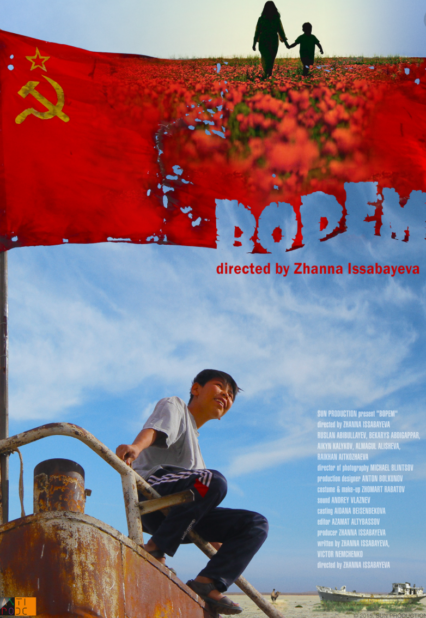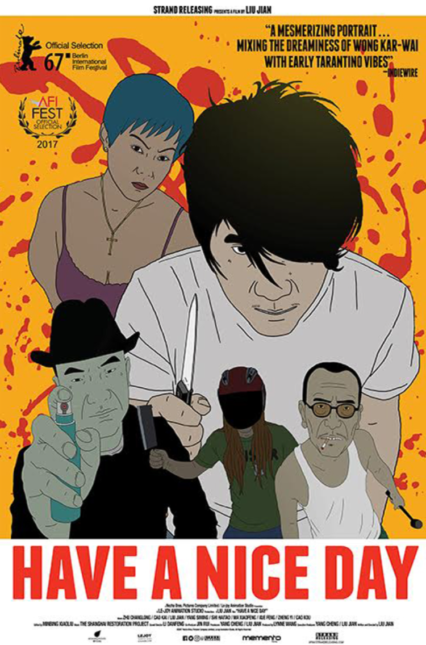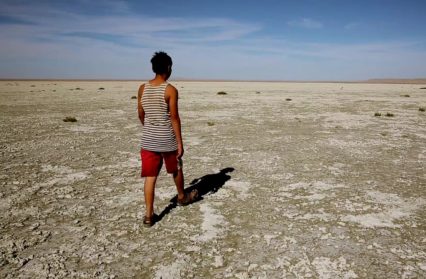Nia Edwards-Behi reviews some of the best picks in part one of her review of this year’s Silk Road themed Wales One World Film Festival, with films from China and Kazakhstan.
This year’s Wales One World Film Festival boasts an incredible line-up of films, with a focus on its central ‘Tales From the Silk Road’ theme. The programme is 50% F-Rated (so either written and/or directed by a woman) and showcases drama and comedy, documentary and animation and so much more in its selections. The Wales One World festival begins in Swansea, at Taliesin Arts Centre, on March 13th, and plays also at Aberystwyth Arts Centre and Tramshed, Cardiff, before moving to Theatr Clwyd, Mold, in April. Below are capsule reviews of just some of the wonderful films on offer.
Free and Easy (Geng Jun, China 2016, 97 mins)
In a seemingly abandoned town in Northern China, a soap salesman comes a-knocking. A crime occurs. The salesman is a con artist, and the locals are too. The town is home to a Buddhist monk, a Christian man searching for his mother, a landlady and her civil servant husband, and two ineffective police officers. Through a series of vignettes of meetings between these characters, life in this town is painted as stark and lonely, though perhaps not quite so miserable as it seems at first glance.
Free and Easy is a tinder-dry black comedy, so dry that I expect some will watch it and wonder where the humour lies. For me, the humour lies in two key aspects of the film, the first being in the entertainingly straight-faced performances from a cast of non-actors. They play characters thrust into absurdist situations with little sense of surprise. The absurdity is every day in this town. Underlining this stark humour is director Geng Jun’s incredible use of out-of-frame space and immaculate comic timing. A simple scene of introduction between two men – one of whom sits, off-screen, on a toilet – is rendered even funnier by its expertly cinematic staging.
The film offers moments of fraternity, despite its overwhelmingly bleak view of society, though the ending is perhaps not quite as satisfying as the strength of the rest of the film would make one hope. That being said, it can boast some very enjoyable closing credits.
Bopem (Zhanna Issabayeva, Kazakhstan 2015, 77 mins)
A young man, Kayan, is given devastating news – he has three months to live, unless he can receive specialist treatment in the city. He cannot afford it and is unlikely to qualify for a free procedure due to quota restrictions. Returning to his remote village, Kayan seeks simple, but brutal, revenge on the people he considers to have wronged him, particularly those he sees as responsible for the death of his mother some years earlier.

Bopem is a desolate, seemingly hopeless film, though it offers, in the negative, a depiction of how powerful love and compassion can be. Kayan’s story is framed by the stark and dry Aral Sea, and memories of his mother. This is a neat device, and feels necessary in a film that is otherwise very deliberately and slowly paced. The pace is interrupted on occasion by acts of cruelty, which, while sometimes a bit over-done, are nonetheless quite shocking. There are unnerving details, like the repeated sound of a death rattle in a silent aftermath of violence. These outbursts also offer important insights – although Kayan’s deliberate acts of violence are motivated, he is also shown to be compassionate to others who are victims of more banal cruelty.
The sense of ecological and societal loss that forms the backdrop of Kayan’s personal losses befits the story in a wonderful way, as well as providing some truly breath-taking scenery. The film is mostly about children, with adults shown to be harsh and often uncaring, suggesting the sort of life the more carefree – yet not entirely innocent – children will face. The film’s central performance helps anchor us to this desolate and hopeless landscape, and when the ending comes round, it feels all the more painful. Bopem is a challenge to be good in the face of incredible hardship, and a stark depiction of loss.
Have a Nice Day (Liu Jian, China 2017, 75 mins)
A remarkable animated film from China, Have a Nice Day is a depiction of low lives and high ambition, with a string of people coming into contact with a bag of stolen money. First stolen by delivery driver Xiao Zhan, the bag is pursued by a gangster, a hitman, an inventor and more in this wild ride through a bleak, capitalist society.
The animation itself is at times rough around the edges, but it entirely befits the somewhat anarchic tone of the film itself. Its clean lines adds something to the sparse spaces the characters occupy – a barely used internet café, for example – and offers a sense of detachment and irony that makes the film all the more cool. Its large cast of characters and at times violent encounters might suggest Tarantino, but this is QT without the pomposity. And of course, all this comes in the form of an animation, a medium I dare say most people are not necessarily used to seeing such narratives play out in.

For a genre piece, Have a Nice Day is quite slowly paced, and that genre-pace-medium disassociation might feel jarring for some. The tone takes some getting used to, especially considering the injections of dry humour and absurdity that occur throughout. Xiao Zhan’s motivation adds to this sense of strangeness – he’s stolen the money to help his girlfriend fix her botched cosmetic surgery. It’s actually sweeter than it sounds.
Despite all the questionable life choices and morality of most of the characters in the film, that’s not to say there aren’t a great deal of sympathies to be had here. They’re all just regular folk, after all. My favourite character is a very minor one, but the no-nonsense, bored young clerk at the internet café takes the crown.
Big Fish and Begonia (Liang Xuan & Zhang Chun, China 2016, 105 mins)
Perhaps offering the antithesis of Have a Nice Day is Big Fish and Begonia, a lavish, mythological fantasy animation which might seem to draw easy parallels with the works of Studio Ghibli. However, the mythology here is deeply culturally specific, with very little explanation or pandering to a wide audience, which might go some way to explain the fairly dense, and at times, slightly incomprehensible narrative.
The film broadly tells the story of two worlds, the human world we know and a world between ours and the place where the gods reside. A young girl named Chun visits the human world in the form a dolphin and ignores the strict warnings not to interfere with humans, resulting in a boy losing his life trying to free her from a fishing net. Back in her home plane, Chun breaks with tradition and sacrifices part of her own life in order to bring him back. Chun is now guardian to the boy, who is returned in the form of a narwhal, and names him Kun. She must keep him safe until he grows big enough to return to the human realm – but things do not run smoothly when Kun’s presence begins to destabilise the non-human realm.
There are some grand themes to be found in the film, namely those of responsibility and loyalty, and the film is not as cloyingly emotional as it might be – though it’s not without its moving moments. The film is lavish to look at, with use of digital animation enhancing the majority traditional 2D techniques used. The apparent lack of rules in this near-celestial world means we get stunning images, such as whales flying into the sky and towering flowers, brought incredibly to life by the animators. There is a lot going on in Big Fish and Begonia, and in some ways it is to its credit that the story is not spoon-fed to us. That being said, though, the distinct lack of world-building does make it at times a difficult film to totally understand.
Part Two of Nia’s reviews of the Wales One World line up is available here.
To find out more about all of the films playing at Wales One World – including Oscar-nominated The Square, Studio Ponoc’s Mary and the Witch’s Flower, Hirokazu Kore-eda’s The Third Murder, Warwick Thornton’s drama Sweet Country and documentary The Prince of Nothingwood – head on over to www.wowfilmfestival.com or find the festival on Facebook and Twitter.












